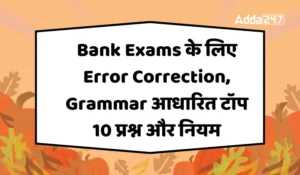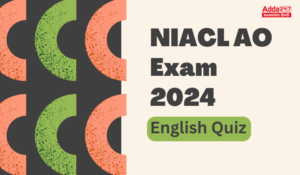Directions (1-5): Rearrange the following five sentences (A), (B), (C), (D) and (E) in the proper sequence to form a meaningful paragraph and then answer the questions given below.
(A) She was undergoing treatment for pneumonia at the time, when the radiologist had raised an alarm and sent her to a cardiologist.
(B) Even in my dazed state, I remember wondering how it was at all possible that a well-built woman like Angel could shrink to half her size within a day of being in hospital.
(C) It was absurd, insane.
(D) Within an hour, she was in hospital and our carefree, happy little world came crumbling down like a house of cards.
(E) The bony women lying helplessly in that sterile hospital room with strange machines blinking around her wasn’t my Angel at all.
Q1. Which of the following will be the LAST (FIFTH) sentence after the rearrangement?
(a) A
(b) B
(c) C
(d) D
(e) E
Show Answer
Sol. ADEBC; C
Q2. Which of the following will be the SECOND sentence after the rearrangement?
(a) A
(b) B
(c) C
(d) D
(e) E
Sol. D
Q3. Which of the following will be the FIRST sentence after the rearrangement?
(a) A
(b) B
(c) C
(d) D
(e) E
Sol. A
Q4. Which of the following will be the FOURTH sentence after the rearrangement?
(a) A
(b) B
(c) C
(d) D
(e) E
Sol. B
Q5. Which of the following will be the THIRD sentence after the rearrangement?
(a) A
(b) B
(c) C
(d) D
(e) E
Sol. E
Directions (6-10): Rearrange the following five sentences (A), (B), (C), (D) and (E) in the proper sequence to form a meaningful paragraph and then answer the questions given below.
(A) Lead researcher Eden King says that a study has revealed that people, who support diversity programs, have changing attitudes in times of economic strife.
(B) “The reality is, diversity programs and disadvantaged groups may be the first to go in times of economic uncertainty.
(C) This caused real problems for people of socially disadvantaged groups,” she says.
(D) King points out that competition for fewer jobs and resources often increases tension among workers, and may especially affect minority groups.
(E) The study also suggests that those in hiring positions may be less likely to hire a minority job applicant in an economic downturn, she adds.
Q6. Which of the following will be the FIRST sentence after the rearrangement?
(a) A
(b) B
(c) C
(d) D
(e) E
Sol. AEDBC; A
Q7. Which of the following will be the SECOND sentence after the rearrangement?
(a) A
(b) B
(c) C
(d) D
(e) E
Sol. E
Q8. Which of the following will be the THIRD sentence after the rearrangement?
(a) A
(b) B
(c) C
(d) D
(e) E
Sol. D
Q9. Which of the following will be the FOURTH sentence after the rearrangement?
(a) A
(b) B
(c) C
(d) D
(e) E
Sol. B
Q10. Which of the following will be the LAST (FIFTH) sentence after the rearrangement?
(a) A
(b) B
(c) C
(d) D
(e) E
Sol. C
Directions (11-15): Rearrange the following five sentences (A), (B), (C), (D) and (E) in the proper sequence to form a meaningful paragraph and then answer the questions given below.
(A) But the problem is that politics has power; religion has only love, peace and the experience of the divine.
(B) Religion has no mundane power like nuclear weapons and atom bombs and guns; its dimension is totally different.
(C) It is just like a beautiful rose flower: its beauty, poetry, its dance makes life worth living, gives life meaning and significance.
(D) Politics can easily interfere with religion; and it has been interfering all along, to such an extent it has destroyed many religious values which are absolutely necessary for the survival of humanity and life on this Earth.
(E) Religion is not a will to power; religion is a search for truth. And the very search makes the religious man humble, simple, innocent.
Q11. Which of the following will be the THIRD sentence after the rearrangement?
(a) A
(b) B
(c) C
(d) D
(e) E
Sol. ADBEC; B
Q12. Which of the following will be the FIRST sentence after the rearrangement?
(a) A
(b) B
(c) C
(d) D
(e) E
Sol. A
Q13. Which of the following will be the SECOND sentence after the rearrangement?
(a) A
(b) B
(c) C
(d) D
(e) E
Sol. D
Q14. Which of the following will be the LAST (FIFTH) sentence after the rearrangement?
(a) A
(b) B
(c) C
(d) D
(e) E
Sol. C
Q15. Which of the following will be the FOURTH sentence after the rearrangement?
(a) A
(b) B
(c) C
(d) D
(e) E
Sol. E






 Practice for English Section: 15 Cloze T...
Practice for English Section: 15 Cloze T...
 Bank Exams के लिए Error Correction, Gram...
Bank Exams के लिए Error Correction, Gram...
 English Quiz For NIACL AO Mains 2024 Exa...
English Quiz For NIACL AO Mains 2024 Exa...










